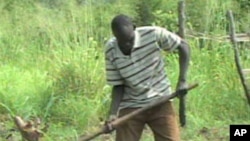During more than two decades of war, the people of southern Sudan relied heavily on food aid brought in by foreign aid agencies. Following the signing of the north-south peace agreement, and on the eve of South Sudan’s independence, the focus is now shifting from providing emergency food relief to developing long-term agricultural policies. Initiatives such as the Southern Sudan Food Security Technical Secretariat, chaired by President Salva Kiir, are coming up with policies that aim to make food insecurity a thing of the past.
Henry Ladu is planting sorghum on land he farms about two hours south of the capital, Juba.
He says he expects to harvest three times the amount he did two years ago, using seeds from the U.N.’s Food and Agriculture Organization.
For him and other farmers in South Sudan, it's a new day. “People are ready to farm. They are digging very seriously so that they cannot wait for food brought by the government. They are ready to cultivate," he said.
People here have long needed emergency food aid to survive.
Civil war plagued Sudan for two decades, before a peace agreement in 2005 ended the fighting between north and south. Then a referendum earlier this year brought southern independence. South Sudan becomes the world’s newest country July 9.
And agricultural is the new government's top priority.
Michelle Iseminger is with the World Food Program. “They are trying to support the WFP in doing an established food strategic grain reserve. So in times of crisis or high food prices, the government then could release food out into the market and/or as free distribution," she said.
The U.N.’s Food and Agriculture Organization and the government are monitoring food production, rainfall and other trends.
Government officials say only four per cent of SouthSudan is farmed, yielding around 700,000 metric tons of cereals a year.
Undersecretary of Agriculture Beda Machar Deng wants to change that. “The Ministry of Agriculture is aiming by year 2011, the food production will be at least 1.2 million metric tons, that could be able to feed the farming population that we have," he said.
Deng says his ministry is encouraging farmers to move beyond subsistence farming. “The farmer is going to be advised, to increase the farm size. By increasing the farm size, he is going to be advised to use the improved seeds. He is going to be advised also to use the hand tools," he said.
But South Sudan's limited number of all-weather roads presents a problem. The FAO's chief technical advisor Ali Said said, “I think building roads has been a major challenge in South Sudan, and that requires massive investment. This is where I think the international community, bilateral and multi-lateral donors, can really help in connecting surplus-producing areas with deficit-producing areas."
Cattle rustling and banditry also are problems.
As are the remnants of war, said Undersecretary Deng. “Even up to now, the mines are taking tractors, up to now the mines are taking people, up to now the mines are also blowing up cattle in the farms. The mines are still there, so the population is still fearing," he said.
But, Deng says he still thinks that with the right planning and support South Sudan can be become Africa's breadbasket.




